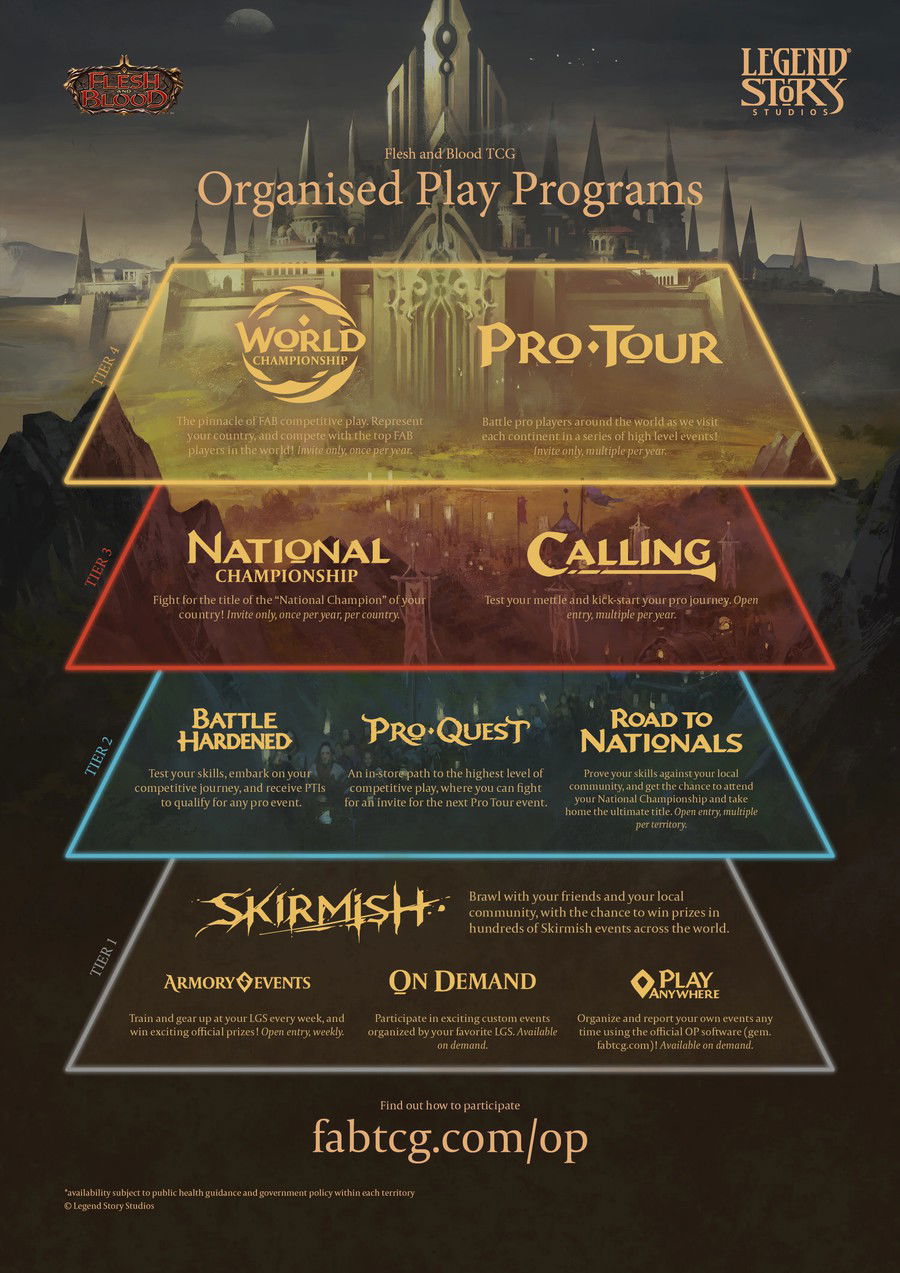Introduction
Recently, LSS changed the way players can qualify for National Championships in their respective countries. So far, they could qualify through XP, which are points obtained by, literally, playing and winning any tournament - however, in 2024, this qualification will happen over an ELO system. After all, what does this mean?
Let's analyze this change thoroughly, see how it will affect FaB, and who wins (or loses) with it.
FaB's Professional Circuit
However, before we take a look at the actual changes, we have to understand how tournaments and the competitive circuit work in Flesh and Blood.
Ad

According to the image above, this game has several types of tournaments (which I'll call OPs throughout this article) that are separated into different tiers:
- Tier 0: The only event that is in this category are Welcome Events, which are 100% centered on teaching new players how to play, and don't add anything valuable to the competitive system.
- Tier 1: casual OPs that include local store tournaments (Armories), unrelated tournaments organized according to player demand by stores (On Demand), tournaments organized by the players themselves (Play Anywhere), and casual tournaments with better prize pools and that award Living Legend points to heroes (Skirmish); Armories, On Demands, and Skirmishes provide XP to players.
- Tier 2: The first competitive OPs that offer a place at the Pro Tour (Pro Quest), Nationals (Road to Nationals), or a spot into any other higher bigger competitive event (the PTIs) (Battle Hardened). All of them not only award XP but also alter your ELO ranking.
- Tier 3: Bigger competitive OPs divided into several days worth of events; the National Championship only accepts guests, and the Calling is open to the public. All of them offer PTIs.
- Tier 4: The most competitive OPs possible, professionally speaking; they are divided into several days worth of events and different formats (also great prize pools). The tournaments at this level are Pro Tours and Worlds, and both only accept players who have qualified or were invited.
The idea with these Tiers is having a clear path to follow if you want to have a career as a professional Flesh and Blood player, from the very start, the Armories, until Worlds. It is highly praised by the community, but the most recent change can make it harder for players to achieve their goals.
The Change
For many, the highest competitive level they could get to was Nationals, be it because of the player's own availability, how hard it was for them to travel abroad, or only because their ambition only went as far as becoming a national champion - and that is enough. Until now, there were only two ways of qualifying for Nationals (considering it is a closed event): getting Top 4 at any Road to Nationals event or through XP.
"Qualifying Through XP" meant that, in Brazil's case (for instance), in a National Championship with 96 players, approximately 70 players would qualify through XP (the others would get their spot through Road to Nationals events). You'd get XP by winning OPs at any tier - including Armories.
Each tournament tier had a higher XP multiplier. On Demand events would give you 1 XP per victory, Armories would give you 3 XP, Skirmish would give you 6 XP, and so on and so forth. So, the more tournaments a player enters and wins, the more XP they'd get. This system benefitted those who played in tournaments very often - which could be tournaments that gave out a lot of XP or not.
Ad
However, in their latest announcement, LSS changed this rule. Now, besides Road to Nationals events, XP qualification was replaced by ELO.
What is ELO?
Unlike XP, which is a standard that showcases the number of events a player has attended, ELO showcases the quality of a player at Tier 2 or higher events. ELO isn't something exclusive to Flesh and Blood, considering it is very popular in other competitive games, such as chess, for instance. Its functioning is purely based on mathematics.
Let's simplify what it represents in practice:
Every player starts with a base amount of ELO (in Flesh and Blood's case, 1500 points), so literally every single player who creates an account in the game nowadays will start with this base. As they play Tier 2 or higher tournaments (no matter which format), they can win or lose points. But these gains and losses aren't always the same.
As ELO showcases the quality of a player, winning or losing points will be different depending on your opponent, and, the greatest the distance between each player's points, the more points will go into this math. So, in practice, the closest your ELO is from your opponent's, the fewer points will be on the line, but, the further it is, the more points will be on the line.
A player with a significant amount of ELO can be heavily punished if they lose to a player with a much lower amount of ELO, but identical ELOs have identical losses or gains.
Considering this, how good it is to swap a quantity-based standard for a quality-based standard?
Pros
The first pro regarding this change is that we no longer need to play countless games to stack our points. Basically, to qualify for Nationals, you don't need to be active in the game on a weekly basis, you just need to get results in the events "that matter" (Pro Quest seasons and Road to National events, for instance) - if a player does this, they'll have a comfortable position at the National ranking.
Another advantage is that winning Armories is less important. This means winning casual events (Tier 1) presents no competitive advantage (except for the Cold Foil cards and the playmat), considering these victories won't affect your competitive journey. This makes these events really casual - environments to test out decks or play different strategies.
Furthermore, qualifying through ELO doesn't benefit players that "farm" Armory events, which means, players who play too many tournaments a week and get victory after victory in these tournaments.
Cons
Even though it has some advantages, the overall community response hasn't been positive.
The first disadvantage is that it will be less democratic to qualify for Nationals. In a country like Brazil, the game is still extremely concentrated in the main cities and their surroundings, as are Tier 2 or higher events - this limits the competitive environment and brings fewer opportunities. With XP, players in less favorable locations could still qualify through Armories or other events, like Skirmishes and pre-release: you just had to get results consistently and play somewhat frequently.
Ad
Another factor the community brought up about the disadvantages of ELO is that, even if the player is talented, a card game like Flesh and Blood is still subject to variance.
Unlike chess, for instance, which is a game that works with complete information (which means, all the information you need to know to play the game is available in front of you), Flesh and Blood works on incomplete information: you don't know what's in your opponent's hand, their arsenal, the cards in their deck, the order of their cards, and many others. This puts the player, as consistent as their deck is, subject to card draw variance.
Imagine a Dash I/O player that, throughout the match, drew three items and a Maximum Velocity, or a Bravo, Showstopper player who drew a hand full of red cards. As skillful as players are, variance can cost them the game, and, consequently, they'll lose ELO points - something that doesn't happen with XP, considering your losses don't alter your points.
My Take
Of course, each player has their own opinions regarding this change. I'll present my opinion below, and how good (or bad) it is for the competitive scene - particularly the Brazilian competitive scene.
XP Also Showcases a Player's Quality
Even though ELO is a safer measure of a player's quality, XP can also measure how good a player is. As the XP multiplier is different in higher tier events, a player who takes part in, and wins matches at these tournaments also has their victories reflected on their XP, and this player will also have a higher amount of XP than those players that only play Armory events.
The Change Caught Many Veteran Players Off Guard
This change came very close to the National Championships themselves. This means players who have played the game for longer will have less time to improve their ELOs, and, additionally, many players who didn't really care about their ELOs (considering this standard was only relevant in tournaments that were much more competitive) will struggle a bit more. So, it will be difficult to have a reasonable ELO in time for Nationals.
Fewer Opportunities to Improve your ELO
Countries across the world have organized countless competitive events: Battle Hardened, Calling, Pro Tour, and many others. However, Brazil still hasn't had the opportunity to organize that many events. Apart from a Battle Hardened in 2023, the only other Tier 2 events that happened in this country, for instance, were Pro Quest and Road to Nationals, and this significantly limits the number of opportunities players have to improve their ELO, whereas XP can be obtained every week at less important tournaments.
Lack of Incentive to Play Armories
Alright, we still have Cold Foils, promo cards, and the playmat - however, this change could significantly lower the interest of more competitive players in Armory events. Even though this could be an advantage to some, if these players no longer play, the competitive level at these tournaments could lower considerably, and, consequently, it could make some players frustrated, if they want to take part in higher tier events. There are other, more casual options for this type of tournament, such as Commoner and UPF.
Ad
What about you, what did you think of this change? Does it improve or worsen the game's competitive scene? Do you think it will be harder of easier to qualify for Nationals?
Thank you for reading, and until next time.









— Commenti0
Diventa il primo a commentare